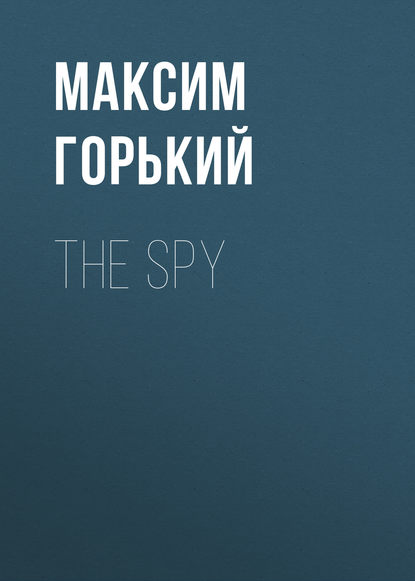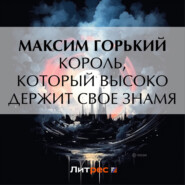По всем вопросам обращайтесь на: info@litportal.ru
(©) 2003-2024.
✖
The Spy
Настройки чтения
Размер шрифта
Высота строк
Поля
At night Yevsey dreamed that his cousin Yashka seated himself on his chest, seized him by the throat, and choked him. He awoke, and heard Piotr's angry dry thin voice in the other room:
"I spit upon the Czar's empire and all this hum-buggery!"
A woman laughed, and someone's thin voice sounded:
"Hush, hush, don't bawl."
"I have no time to calculate who is right, and who is wrong. I am not a fool, I am young, and I ought to live. This rapscallion reads me lectures about autocracy, and I fuss about for three hours as a waiter, near every sort of scamp. My feet ache, my back pains from the bows. If the autocracy is dear to you, then don't be stingy with your money. But I won't sell my pride to the autocracy for a mere penny. To the devil with it!"
Yevsey looked drowsily through the window, his gaze losing itself in the sleepy depth of the autumn morning. Blinded, he quietly flung himself back in bed, and again fell asleep.
Several hours later he was sitting on the curb opposite Pertzev's house. He walked back and forth a long time, counted the windows in the house, measured its width with his steps, studied in all its details the grey front flabby with old age, and finally grew tired. But he had not much time to rest. The writer himself came out of the door with an overcoat flung over his shoulders, no overshoes on his feet, his hat on one side of his head. He walked across the street straight up to Yevsey.
"He will give me a slap in the face," thought Yevsey, looking at the sullen face and the lowering red brows. He tried to rise and go away, but was unable to move, chained to the spot by fear.
"Why are you sitting here?" he heard an angry voice.
"Nothing."
"Get away from here."
"I can't."
"Here's a letter. Go. Give it to him who sent you here."
"I can't."
"Why not?"
The large blue eyes commanded. Yevsey had not the power to disobey the look. Turning his face aside he mumbled:
"I – I – I have no permission – to take anything from you – or to converse with you. I am going away."
"Yes, go away," the author commanded, and for some reason smiled a morose smile.
Klimkov took the grey envelope, and walked away, without asking himself where he was going. He held the envelope in his right hand on a level with his breast, as if it were something murderous, threatening unknown misfortune. His fingers ached as from cold.
"What is going to happen to me?" knocked importunately at his brain.
Suddenly he noticed the envelope was not sealed. This amazed him. He stopped, looked around, and quickly removed the letter.
"Take this dunce away from me. Mironov," he read.
He heaved a sigh of relief.
"I must give this to Maklakov. He will scold me. Maybe I ought to turn back. But it's not necessary. Somebody else will come soon anyway."
Though his fear had disappeared, Yevsey felt sad from the realization of his unfitness for the position, and he felt heavy at the thought that he had again failed to suit the spy, whom he liked so much.
He found Maklakov at dinner in the company of a little squint-eyed man dressed in black.
"Let me introduce you. Klimkov – Krasavin."
Yevsey put his hand in his pocket to get out the letter, and said in an embarrassed tone:
"This is the way it happened – "
Maklakov held up his hand.
"You will tell me later. Sit down, and have your dinner."
His face was weary, his eyes dim, his light straight hair dishevelled.
"Evidently got drunk yesterday," thought Yevsey.
"No, Timofey Vasilyevich," the squint-eyed man said coldly and solemnly. "You are not right. There's something pleasant in every line of work if you love it."
Maklakov looked at him, and drank a large glass of whiskey in one gulp.
"They are people, we are people, that doesn't signify anything. One says this, another says that, and I do just as I please."
The squint-eyed man noticed that Yevsey was looking at his eyeballs as they rolled apart, and put on a pair of glasses with tortoise-shell rims. His movements were soft and alert, like a black cat's. His teeth were small and sharp, his nose straight and thin. When he spoke his rosy ears moved. His crooked fingers kept quickly rolling a crumb of bread into little pellets, which he placed on the edge of his plate.
"An assistant?" he asked, nodding his head toward Yevsey.
"Yes."
"How's business, young man?"
"I just began yesterday."
"Oh, oh!" Krasavin nodded his head. Pinching his thin dark mustache, he began to speak fluently: "Of course, Timofey Vasilyevich, you can't step on the trail of life's destiny. According to God's law, children grow old, people die. Only all this doesn't concern you and me. We received our appointed task. We are told to catch the people who infringe on law and order. That's all. It's a hard business, it's a clever business. To use a figure of speech, it is a kind of hunt."
Maklakov rose from the table, and walked into a corner, from where he beckoned to Yevsey.
"Well, what is it?"
Yevsey gave him the note. The spy read it, looked into Klimkov's face in astonishment, and read it again.
"From whom is this?" he asked in a low voice.
Yevsey answered in an embarrassed whisper.
"He himself gave it to me. He came out into the street."
In the expectation of a rebuke, or even a blow, he bent his neck. But hearing a low laugh he cautiously raised his head, and saw the spy looking at the envelope with a broad smile on his face and a merry gleam in his eyes.
"Oh, you strange fellow," said Maklakov. "Now keep quiet about this, you droll creature."
"I spit upon the Czar's empire and all this hum-buggery!"
A woman laughed, and someone's thin voice sounded:
"Hush, hush, don't bawl."
"I have no time to calculate who is right, and who is wrong. I am not a fool, I am young, and I ought to live. This rapscallion reads me lectures about autocracy, and I fuss about for three hours as a waiter, near every sort of scamp. My feet ache, my back pains from the bows. If the autocracy is dear to you, then don't be stingy with your money. But I won't sell my pride to the autocracy for a mere penny. To the devil with it!"
Yevsey looked drowsily through the window, his gaze losing itself in the sleepy depth of the autumn morning. Blinded, he quietly flung himself back in bed, and again fell asleep.
Several hours later he was sitting on the curb opposite Pertzev's house. He walked back and forth a long time, counted the windows in the house, measured its width with his steps, studied in all its details the grey front flabby with old age, and finally grew tired. But he had not much time to rest. The writer himself came out of the door with an overcoat flung over his shoulders, no overshoes on his feet, his hat on one side of his head. He walked across the street straight up to Yevsey.
"He will give me a slap in the face," thought Yevsey, looking at the sullen face and the lowering red brows. He tried to rise and go away, but was unable to move, chained to the spot by fear.
"Why are you sitting here?" he heard an angry voice.
"Nothing."
"Get away from here."
"I can't."
"Here's a letter. Go. Give it to him who sent you here."
"I can't."
"Why not?"
The large blue eyes commanded. Yevsey had not the power to disobey the look. Turning his face aside he mumbled:
"I – I – I have no permission – to take anything from you – or to converse with you. I am going away."
"Yes, go away," the author commanded, and for some reason smiled a morose smile.
Klimkov took the grey envelope, and walked away, without asking himself where he was going. He held the envelope in his right hand on a level with his breast, as if it were something murderous, threatening unknown misfortune. His fingers ached as from cold.
"What is going to happen to me?" knocked importunately at his brain.
Suddenly he noticed the envelope was not sealed. This amazed him. He stopped, looked around, and quickly removed the letter.
"Take this dunce away from me. Mironov," he read.
He heaved a sigh of relief.
"I must give this to Maklakov. He will scold me. Maybe I ought to turn back. But it's not necessary. Somebody else will come soon anyway."
Though his fear had disappeared, Yevsey felt sad from the realization of his unfitness for the position, and he felt heavy at the thought that he had again failed to suit the spy, whom he liked so much.
He found Maklakov at dinner in the company of a little squint-eyed man dressed in black.
"Let me introduce you. Klimkov – Krasavin."
Yevsey put his hand in his pocket to get out the letter, and said in an embarrassed tone:
"This is the way it happened – "
Maklakov held up his hand.
"You will tell me later. Sit down, and have your dinner."
His face was weary, his eyes dim, his light straight hair dishevelled.
"Evidently got drunk yesterday," thought Yevsey.
"No, Timofey Vasilyevich," the squint-eyed man said coldly and solemnly. "You are not right. There's something pleasant in every line of work if you love it."
Maklakov looked at him, and drank a large glass of whiskey in one gulp.
"They are people, we are people, that doesn't signify anything. One says this, another says that, and I do just as I please."
The squint-eyed man noticed that Yevsey was looking at his eyeballs as they rolled apart, and put on a pair of glasses with tortoise-shell rims. His movements were soft and alert, like a black cat's. His teeth were small and sharp, his nose straight and thin. When he spoke his rosy ears moved. His crooked fingers kept quickly rolling a crumb of bread into little pellets, which he placed on the edge of his plate.
"An assistant?" he asked, nodding his head toward Yevsey.
"Yes."
"How's business, young man?"
"I just began yesterday."
"Oh, oh!" Krasavin nodded his head. Pinching his thin dark mustache, he began to speak fluently: "Of course, Timofey Vasilyevich, you can't step on the trail of life's destiny. According to God's law, children grow old, people die. Only all this doesn't concern you and me. We received our appointed task. We are told to catch the people who infringe on law and order. That's all. It's a hard business, it's a clever business. To use a figure of speech, it is a kind of hunt."
Maklakov rose from the table, and walked into a corner, from where he beckoned to Yevsey.
"Well, what is it?"
Yevsey gave him the note. The spy read it, looked into Klimkov's face in astonishment, and read it again.
"From whom is this?" he asked in a low voice.
Yevsey answered in an embarrassed whisper.
"He himself gave it to me. He came out into the street."
In the expectation of a rebuke, or even a blow, he bent his neck. But hearing a low laugh he cautiously raised his head, and saw the spy looking at the envelope with a broad smile on his face and a merry gleam in his eyes.
"Oh, you strange fellow," said Maklakov. "Now keep quiet about this, you droll creature."

















